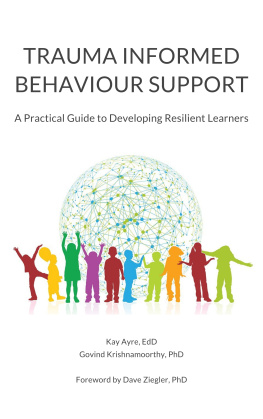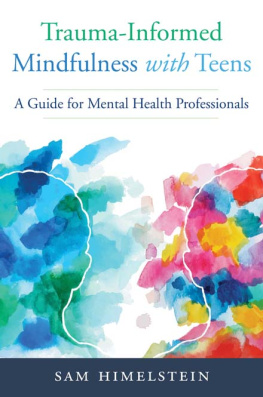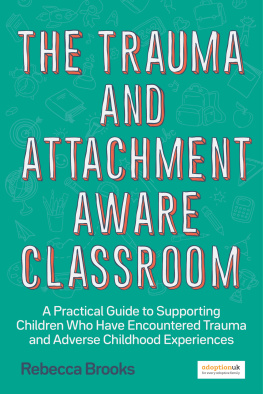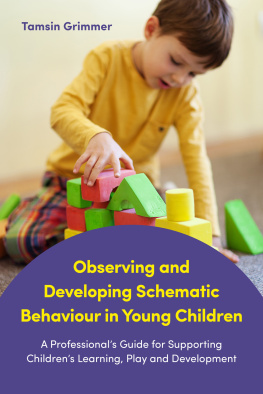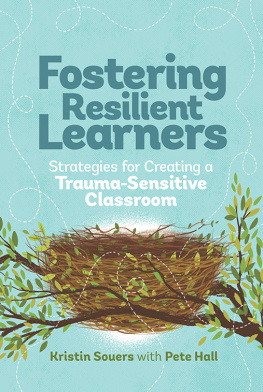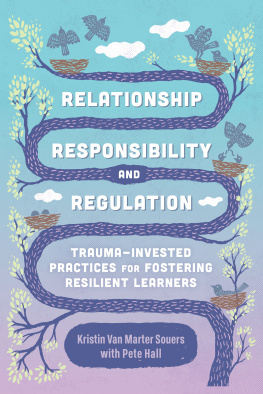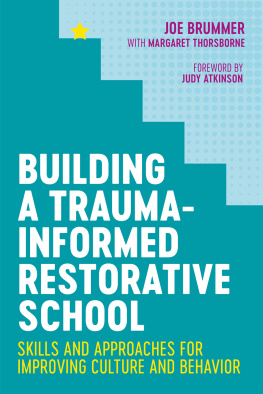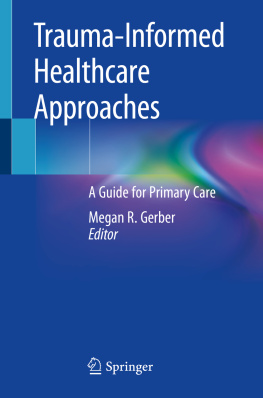Kay Ayre - Trauma Informed Behaviour Support: A Practical Guide to Developing Resilient Learners
Here you can read online Kay Ayre - Trauma Informed Behaviour Support: A Practical Guide to Developing Resilient Learners full text of the book (entire story) in english for free. Download pdf and epub, get meaning, cover and reviews about this ebook. year: 2020, publisher: University of Southern Queensland, genre: Children. Description of the work, (preface) as well as reviews are available. Best literature library LitArk.com created for fans of good reading and offers a wide selection of genres:
Romance novel
Science fiction
Adventure
Detective
Science
History
Home and family
Prose
Art
Politics
Computer
Non-fiction
Religion
Business
Children
Humor
Choose a favorite category and find really read worthwhile books. Enjoy immersion in the world of imagination, feel the emotions of the characters or learn something new for yourself, make an fascinating discovery.
Trauma Informed Behaviour Support: A Practical Guide to Developing Resilient Learners: summary, description and annotation
We offer to read an annotation, description, summary or preface (depends on what the author of the book "Trauma Informed Behaviour Support: A Practical Guide to Developing Resilient Learners" wrote himself). If you haven't found the necessary information about the book — write in the comments, we will try to find it.
Kay Ayre: author's other books
Who wrote Trauma Informed Behaviour Support: A Practical Guide to Developing Resilient Learners? Find out the surname, the name of the author of the book and a list of all author's works by series.
Trauma Informed Behaviour Support: A Practical Guide to Developing Resilient Learners — read online for free the complete book (whole text) full work
Below is the text of the book, divided by pages. System saving the place of the last page read, allows you to conveniently read the book "Trauma Informed Behaviour Support: A Practical Guide to Developing Resilient Learners" online for free, without having to search again every time where you left off. Put a bookmark, and you can go to the page where you finished reading at any time.
Font size:
Interval:
Bookmark:

Trauma Informed Behaviour Support: A Practical Guide to Developing Resilient Learners by University of Southern Queensland is licensed under a Creative Commons Attribution-ShareAlike 4.0 International License, except where otherwise noted.
Trauma Informed Behaviour Support by Kay Ayre and Govind Krishnamoorthy is licensed under a Creative Commons Attribution-ShareAlike 4.0 International License, except where otherwise noted.
All images contained within this book retain their copyright or original Creative Commons Licences and can only be re-used under their respective licences.
Disclaimer
Note that corporate logos (such as the USQ Phoenix, and any other company represented) and branding are specifically excluded from the Creative Commons Attribution-ShareAlike 4.0 International Licence of this work, and may not be reproduced under any circumstances without the express written permission of the copyright holders. The following content is specifically excluded from the Creative Commons Attribution-Sharealike 4.0 International licence of this work, and may not be reproduced under any circumstances without the express written permission of the copyright holders
Content from the Australian Childhood Foundation
Content from Beacon House
Content from Sandra Bloom
Content from Substance Abuse and Mental Health Services Administration (SAMHSA)
Loman, S., & Borgmeier, C. (2010). Practical functional behavioural assessment training manual for school-based personnel (p. 57) Retrieved from http://pdxscholar.library.pdx.edu/cgi/viewcontent.cgi?article=1001&context=sped_fac
National Scientific Council on the Developing Child. (2014). Excessive stress disrupts the architecture of the developing brain (Working Paper 3). Retrieved from http://developingchild.harvard.edu/resources/reports_and_working_papers/working_papers/w p3/.
The National Child Traumatic Stress Network. (2014). Trauma types. Retrieved from https://www.nctsn.org/.
Sorrels, B. (2015). Reaching and teaching children exposed to trauma. Lewisville, NC: Gryphon House, Inc.
Collaborative for Academic, Social, and Emotional Learning. (2020). What is SEL? Retrieved from https://casel.org/what-is-sel/.
Dr Kay Ayre is a lecturer in Early Childhood Studies in the School of Education at Edith Cowan University, Western Australia. She has a background in early years teaching and behaviour support. She has worked extensively with disengaged and disruptive children, their teachers and schools. Kay has a passion for helping build the capacity of teachers to develop and maintain positive, inclusive classrooms with a focus on supporting children affected by trauma who demonstrate serious, disruptive behaviour. Her research interests are in challenging behaviour of children, positive behaviour support, trauma informed practice and parent-school engagement.
Kay can be contacted by email at: k.ayre@ecu.edu.au
Dr Govind Krishnamoorthy is a clinical psychologist and lecturer in the School of Psychology and Counselling at the University of Southern Queensland, Australia. Govinds clinical practice and research focuses on improving mental health and educational outcomes for children and adolescents from marginalised backgrounds. He has worked extensively with children and families exposed to abuse and neglect in both public and private sector. Govind has collaborated extensively with schools and a number of child welfare services in implementing systems approaches for trauma informed and attachment sensitive practices.
Govind can be contacted by email at: Govind.Krishnamoorthy@usq.edu.au
Govind, my sincere thanks for your inspiration, guidance and friendship. To all the heroes making a difference to the lives of vulnerable children and young people, this book is for you.
Thank you Kay for your wisdom, patience and generosity. Thank you to my family for their sacrifices and giving me the opportunities they never had. I dedicate this book to my two girls.
Special thanks to Mr Adrian Stagg and Miss Nikki Andersen and members of the Open Educational Practice community for their invaluable support.
The authors wish to acknowledge the Aboriginal and Torres Strait Islander peoples of this nation. We acknowledge the traditional owners of the country throughout Australia and their continuing connection to the land, culture and community. We acknowledge the traditional custodians of the lands on which we live and work, and where the book was written. We acknowledge the cultural diversity of all Aboriginal and Torres Strait Islander peoples and pay respect to Elders past, present and future. We celebrate the continuous living cultures of First Australians and acknowledge the important contributions Aboriginal and Torres Strait Islander people have and continue to make in Australian society.
As I write this the planet is in the grasp of a global pandemic in which 28 million individuals have become ill and nearly one million have died. This event has changed the lives of nearly everyone in the world. By the time you read this it is my sincere hope that there are effective vaccines and ample quantities to address this catastrophe. I feel the pandemic has been able to put the focus of this book into perspective. As terrible and heartbreaking as the COVID 19 pandemic has been, the impact of trauma on the children of the world has been and continues to be much greater. However, unlike the pandemic crisis that headlines the news, children living with trauma is a hidden crisis that only catches the attention of media and world leaders periodically and that attention is sadly not sustained, and no vaccine will address this hidden crisis.
When I say that childhood trauma impacts our children far more than a viral pandemic, here are a few comparisons. The United States has 13 times the total population of Australia. The United States (US) leads the world in many areas, some we dont like to discuss such as more incarcerated individuals than any other nation, and more child abuse than any country that has data. The US does have excellent child abuse data, so we know that every year in the US around 1,700 children die of child maltreatment. However, COVID 19 so far has resulted in 60 child deaths. Any childs death is tragic, but a child in the US is 28 times more likely to die at the hands of parents and care providers than from the pandemic, and 10 times more likely to be a victim of child abuse than infected by the COVID 19 virus. Recent data has found 182 children in Australia died of maltreatment in a year. Compare that number to the child deaths in Australia from COVID 19 where no child death had been reported as I write this. Trauma often has an impact throughout the lifespan of the individual, unlike an illness in which many children recover from. You get the point, we call the pandemic a catastrophe, but child abuse and the resulting trauma and its impact on learning and the childs future is a far greater catastrophe.
Font size:
Interval:
Bookmark:
Similar books «Trauma Informed Behaviour Support: A Practical Guide to Developing Resilient Learners»
Look at similar books to Trauma Informed Behaviour Support: A Practical Guide to Developing Resilient Learners. We have selected literature similar in name and meaning in the hope of providing readers with more options to find new, interesting, not yet read works.
Discussion, reviews of the book Trauma Informed Behaviour Support: A Practical Guide to Developing Resilient Learners and just readers' own opinions. Leave your comments, write what you think about the work, its meaning or the main characters. Specify what exactly you liked and what you didn't like, and why you think so.

